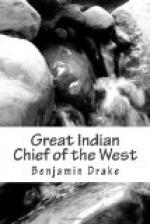Subsequently to the treaty of 1804, the erection by the government of the United States, of Fort Madison on the Mississippi, above the Des Moines rapids, gave some dissatisfaction to the Sacs and Foxes. This was increased by the British agents and traders, who instigated them to resist the encroachments of the Americans, now beginning to press upon their hunting grounds. Of this interference on the part of the British, with the Indians, there can be no doubt. Governor Harrison in a letter to the secretary of war, dated Vincennes, July 15th, 1810, says, “a considerable number of the Sacs went some time since to see the British superintendent, and on the first instant, more passed Chicago, for the same destination.” General Clark, under date of St. Louis, July 20th, 1810, says, in writing to the same department, “One hundred and fifty Sacs are on a visit to the British agent by invitation, and a smaller party on a visit to the island of St. Joseph, in lake Huron.” John Johnson, Esq. the Indian agent, at Fort Wayne, under date of August 7th, 1810, says, to the secretary at war, “About one hundred Saukees have returned from the British agent, who supplied them liberally with every thing they stood in need of. The party received forty-seven rifles, and a number of fusils with plenty of powder and lead.”
McKee, Dixon, and Girty were open and active agents in exciting the Indians to attack the American frontiers. They held frequent talks with them and supplied them liberally with goods and munitions of war. In 1811, there being a strong probability of a war with Great Britain, a deputation of the Sauks and Foxes, visited Washington city, to see the President, by whom they were told that in the event of a war taking place with England, their great father did not wish them to interfere on either side, but to remain neutral: He did not want their assistance but desired them to hunt and support their families and live in peace. Immediately after the war of 1812, the Sacs and Foxes, with whom, as with Indians generally, war is the great business of life, felt that they ought, as a matter of course, to take sides with one party or the other, and went to St. Louis, to offer their services to the United States agent, to fight against the British; but the offer was declined, on the ground that the government of the United States had resolved not to employ the Indians in that capacity. The machinations of the British, were successfully continued. The Sacs and Foxes divided upon the question of taking up arms against the United States. A part of them claimed the protection of the American government and received it; a part joined the British standard, Black Hawk among the number, and fought against the Americans until the peace of 1815. The number of warriors who joined the British is supposed to have been about two hundred, and they have ever since been known as the “British Band,” at the head of which has been “General Black Hawk.”




